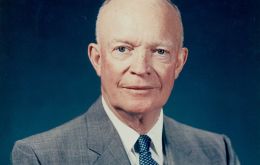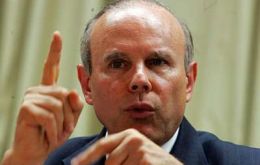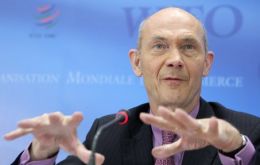MercoPress. South Atlantic News Agency
Economy
-
Thursday, July 28th 2011 - 06:22 UTC
The US government debt ceiling: what did Eisenhower do back in 1953?

Should the US follow the example of President Dwight Eisenhower back in 1953, asks Alex J Pollok, resident fellow at the American Enterprise Institute and Anne Canfield president of Canfield & Associates, Washington, D.C. in an article published in The American Journal of the AEI.
-
Thursday, July 28th 2011 - 06:19 UTC
Lower House to vote on (doomed) Republican proposal to raise US debt ceiling

US House of Representatives speaker John Boehner is urging Republicans to back his plan to cut the US budget and raise the debt limit. Boehner's appeal to conservative House Republicans came despite a White House veto threat and rejection from Democratic leaders in the Senate.
-
Wednesday, July 27th 2011 - 19:28 UTC
Brazil intervenes the derivatives markets in a bid to weaken the Real

Brazil imposed on Wednesday a tax on bets against the US dollar and warned it may boost intervention in the nation’s derivatives market in a bid to weaken a currency that reached a 12-year high this week. The Real declined by the most in almost three months at times loosing up to 2% to the US dollar.
-
Wednesday, July 27th 2011 - 04:49 UTC
Brazil’s development bank lends 30bn dollars at subsidized rate in five months

Lending by Brazil’s BNDES (National economic and social development bank) totalled 43.5 billion Real (29bn dollars approx) in the first five months of the year, representing a contraction of 6% compared to the same period in 2010, according to a bank’ release.
-
Wednesday, July 27th 2011 - 04:07 UTC
Lamy calls on WTO members for “an adult conversation” fearing failure of trade talks

The head of the World Trade Organization Pascal Lamy warned Tuesday its 153 members of the consequences on failing to agree a watered-down global trade deal by December and called for “an adult conversation” over what to do next.
-
Wednesday, July 27th 2011 - 03:48 UTC
Argentine farmers furious with government’s wheat export policy

Argentina liberated 450.000 tons of wheat for export, a decision which is believed to be closely linked to Sunday’s election in the farming province of Santa Fe where the government of President Cristina Fernandez de Kirchner suffered a major defeat.
-
Tuesday, July 26th 2011 - 20:58 UTC
Brazilians with a strong currency travelling overseas as never before

With the currency ever so strong against the US dollar Brazilians are travelling overseas and spending as never before, according to the latest figures from the Central Bank.
-
Tuesday, July 26th 2011 - 08:25 UTC
S&P upgrades Uruguay’s rating to BB+, just one notch below investment grade

The credit rating agency Standard & Poor’s upgraded on Monday Uruguay’s rating by one notch to BB-plus, only one notch below investment grade, praising years of “prudent and consistent” economic policies in the country.
-
Tuesday, July 26th 2011 - 07:38 UTC
Real soars to its highest in 12 years in spite of billions to support the US dollar

Brazil's Real soared Monday to its highest level against the US dollar since 1999. The dollar was buying 1.53 Real at midday on financial markets, representing a 0.9% increase from Friday. The dollar closed somewhat higher at 1.54 Real but below the 1.55 of twelve years ago.
-
Monday, July 25th 2011 - 20:53 UTC
IMF calls for ‘swift rise in US debt ceiling’ and warns of risks to world economy

The International Monetary Fund urged the United States to swiftly raise the debt ceiling to ward off risks of a credit downgrade that could damage the global economy.
